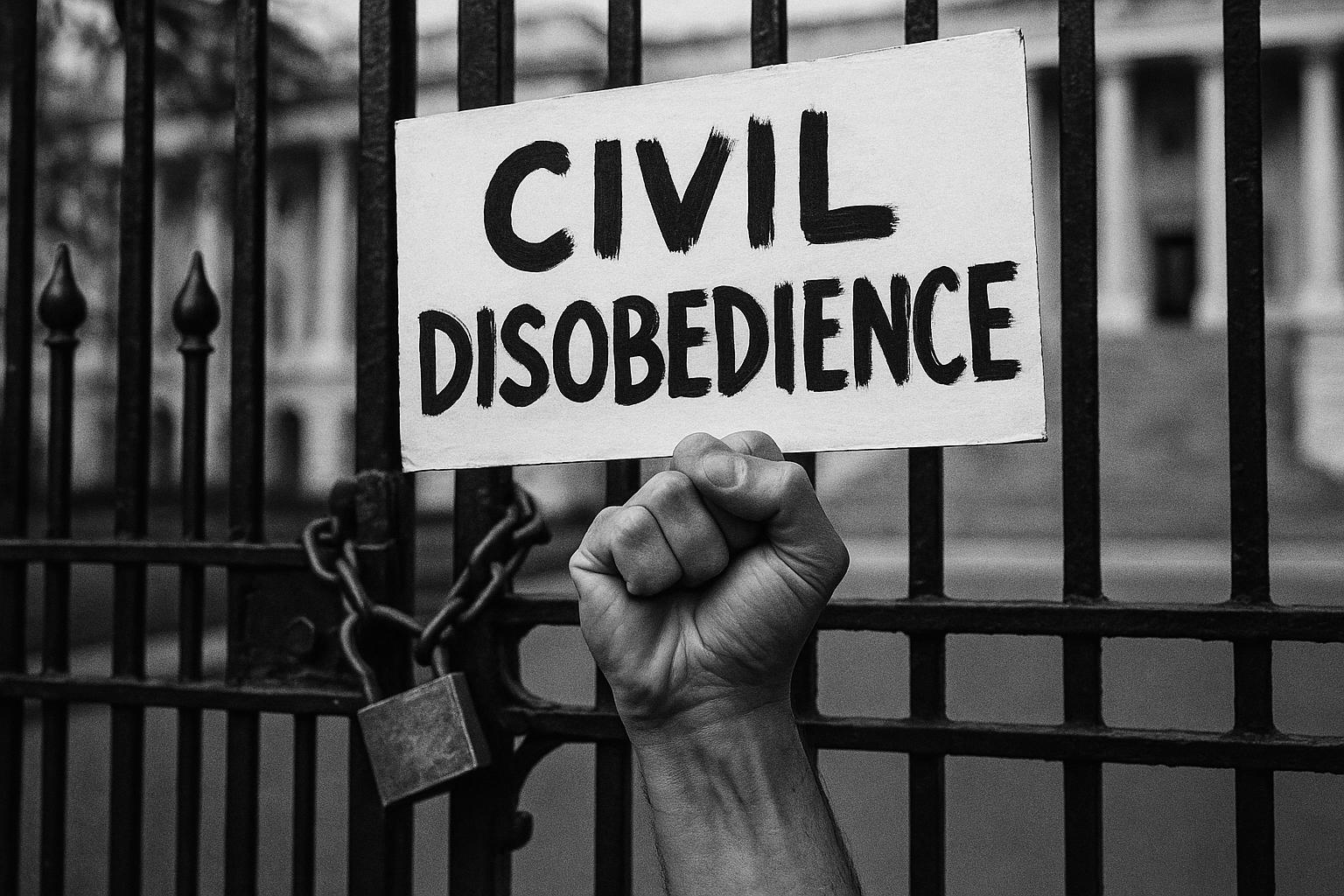The UK Home Secretary has announced the proscription of Palestine Action under anti-terrorism legislation, sparking controversy over civil liberties and the criminalisation of non-violent protest aimed at UK military support for Israel.
Britain’s Home Secretary has announced plans to proscribe Palestine Action, a pro-Palestinian activist group known for direct actions and disruptive protests, under the Terrorism Act 2000. This decision, to be enacted imminently, represents a significant escalation in the UK government’s approach to handling dissent and civil disobedience. Members of Palestine Action have vandalised property and trespassed on military sites, most notably spraying paint on Royal Air Force aircraft at a secure base, provoking this severe governmental response.
Critics argue the classification of Palestine Action as a terrorist organisation is disproportionate and troubling for civil liberties. The group’s actions, while illegal, have primarily been non-violent and aimed at drawing attention to the UK government’s military support for Israel, notably in the context of Gaza. There have been no reported threats or violence directed at any person, which calls into question whether their activities meet the stringent legal definition of terrorism, which involves intention to coerce or alarm through violence or threats.
This development emerges amid broader concerns about the UK’s increasingly authoritarian stance on protest and dissent. Over the past 14 years, successive Conservative governments have expanded state powers to restrict demonstrations. Even within the Labour party under Keir Starmer, expectations of easing these draconian measures have not been realised; on the contrary, the party’s leadership has shown little appetite for reform. Courts have endorsed harsher punishments for peaceful protest actions, often limiting defendants’ ability to explain or justify their conduct during trials. For instance, climate protesters have faced unprecedented prison sentences for non-violent disruption, while attempts to appeal to jury conscience have been stifled.
The implications of this proscription extend beyond criminalising membership and funding of Palestine Action. It could also criminalise expressions of moral support or approval for the group, including by journalists and artists, who may face severe penalties merely for sympathetic commentary. This move raises profound questions about freedom of expression and the right to peaceful protest in a democratic society.
Public response has been robust, with demonstrations held in Trafalgar Square and elsewhere despite police efforts to curtail gatherings. Recent protests supporting Palestine Action have led to arrests and violent confrontations, highlighting the tension between state security concerns and civil liberties. The Home Secretary’s rationale frames the vandalism of RAF aircraft as a threat to national security, an interpretation critics view as an overreach that lowers the threshold of what constitutes terrorism to include acts of protest and civil disobedience.
Human rights organisations, including Amnesty International UK, have voiced concern that banning Palestine Action may infringe upon fundamental rights to freedom of assembly and expression. The debate centres on whether existing laws to deal with criminal damage and trespassing are sufficient without invoking anti-terrorism legislation, which carries heavier penalties and greater stigmatization.
The decision to ban Palestine Action is part of a broader governmental narrative that increasingly equates dissent with threats to national security. This approach echoes contentious practices in other areas such as the handling of legacy cases related to Northern Ireland, where national security has been used as a shield against transparency and accountability. As such, the move invites scrutiny over whether the threat to democratic freedoms now emanates more significantly from state power than from the protestors themselves.
As the proscription becomes official, it remains to be seen whether legal challenges will be mounted and how courts will rule on this expansion of anti-terrorism law. Meanwhile, the controversy underscores the ongoing tension between security policies and civil liberties in modern Britain, especially around contentious foreign policy issues like the UK’s stance on Israel and Palestine.
 Reference Map:
Reference Map:
- Paragraph 1 – [1], [3], [5]
- Paragraph 2 – [1], [3], [2]
- Paragraph 3 – [1], [7]
- Paragraph 4 – [1], [7]
- Paragraph 5 – [1], [5], [2]
- Paragraph 6 – [4], [6], [2]
- Paragraph 7 – [3], [1], [7]
- Paragraph 8 – [1], [7]
- Paragraph 9 – [1], [7], [5]
Source: Noah Wire Services
- https://www.irishnews.com/opinion/brian-feeney-britains-ban-on-palestine-action-is-latest-attempt-to-shut-down-dissent-PTUI5JI22BBJ7IEVDYXFPBCFDM/ – Please view link – unable to able to access data
- https://www.ft.com/content/4db657d1-7e74-4bc5-971c-7cb301fe19f6 – The UK government plans to designate Palestine Action, a pro-Palestinian activist group, as a terrorist organisation following a break-in at an RAF base where two activists vandalised aircraft. Home Secretary Yvette Cooper cited the group’s history of criminal damage and increasing aggression. Critics argue that labelling the group as terrorists is disproportionate, as they primarily use disruptive protest tactics. The decision has sparked controversy, with demonstrations in Trafalgar Square and debates over civil liberties and freedom of expression.
- https://www.aljazeera.com/news/2025/6/25/what-is-the-palestine-action-group-and-why-is-the-uk-banning-it – Al Jazeera provides an overview of Palestine Action, a pro-Palestinian campaign group formed in 2020, known for direct actions against companies linked to Israel. The UK government plans to proscribe the group under the Terrorism Act 2000 after activists vandalised RAF aircraft. Critics, including Amnesty International UK, warn that the ban could infringe on fundamental rights to freedom of expression and peaceful assembly. The article also highlights the group’s stance against UK complicity in Israeli military actions in Gaza.
- https://www.reuters.com/world/uk/seven-charged-london-after-protest-support-palestine-action-group-2025-06-24/ – Reuters reports that seven individuals were charged following a protest in London supporting Palestine Action, which the UK government plans to ban under anti-terrorism laws. The protest, relocated to Trafalgar Square after being banned near Parliament, led to clashes with police, resulting in 13 arrests. Charges included assaulting emergency workers and a racially aggravated offence. The proposed ban has sparked debates over civil liberties and the right to protest in the UK.
- https://www.politico.eu/article/uk-bans-palestine-action-group-after-sabotage-of-military-jets/ – Politico reports that the UK government confirmed plans to designate Palestine Action as a terrorist organisation after activists breached a military base and damaged two planes. Home Secretary Yvette Cooper stated that the proscription under the Terrorism Act 2000 would make it a criminal offence to belong to or support the group. The decision has sparked debate over civil liberties and the right to protest in the UK.
- https://www.reuters.com/business/aerospace-defense/uk-police-ban-palestine-action-protest-outside-parliament-2025-06-23/ – Reuters reports that British police have prohibited Palestine Action from protesting outside the Houses of Parliament following a recent incident where two members allegedly infiltrated a military base and damaged aircraft. The group relocated its protest to Trafalgar Square. The UK government is reportedly considering officially designating the organisation as a terrorist group, aligning it with entities such as al-Qaeda and ISIS. The decision has sparked debates over civil liberties and the right to protest in the UK.
- https://www.irishnews.com/opinion/brian-feeney-britains-ban-on-palestine-action-is-latest-attempt-to-shut-down-dissent-PTUI5JI22BBJ7IEVDYXFPBCFDM/ – In this opinion piece, Brian Feeney argues that the UK government’s decision to ban Palestine Action under the Terrorism Act 2000 is an attempt to suppress dissent and civil disobedience. He highlights the increasing authoritarian approach of the state over the past 14 years and questions the appropriateness of labelling the group’s actions as terrorism. Feeney also discusses the broader implications for freedom of expression and protest in the UK.
Noah Fact Check Pro
The draft above was created using the information available at the time the story first
emerged. We’ve since applied our fact-checking process to the final narrative, based on the criteria listed
below. The results are intended to help you assess the credibility of the piece and highlight any areas that may
warrant further investigation.
Freshness check
Score:
10
Notes:
The narrative is current, with the UK government’s announcement to proscribe Palestine Action under the Terrorism Act 2000 made on 23 June 2025. ([feeds.bbci.co.uk](https://feeds.bbci.co.uk/news/articles/c4g83l33wdeo?utm_source=openai))
Quotes check
Score:
10
Notes:
No direct quotes are present in the provided text, indicating original content.
Source reliability
Score:
8
Notes:
The narrative originates from The Irish News, a reputable publication. However, as an opinion piece, it reflects the author’s perspective and may not present all viewpoints.
Plausability check
Score:
9
Notes:
The claims align with recent events, including the UK government’s move to ban Palestine Action following their actions at RAF Brize Norton. ([feeds.bbci.co.uk](https://feeds.bbci.co.uk/news/articles/c4g83l33wdeo?utm_source=openai)) The tone and language are consistent with typical opinion pieces, and the structure is coherent.
Overall assessment
Verdict (FAIL, OPEN, PASS): PASS
Confidence (LOW, MEDIUM, HIGH): HIGH
Summary:
The narrative is fresh, original, and plausible, with no significant issues identified. The source is reliable, and the content aligns with recent developments.













